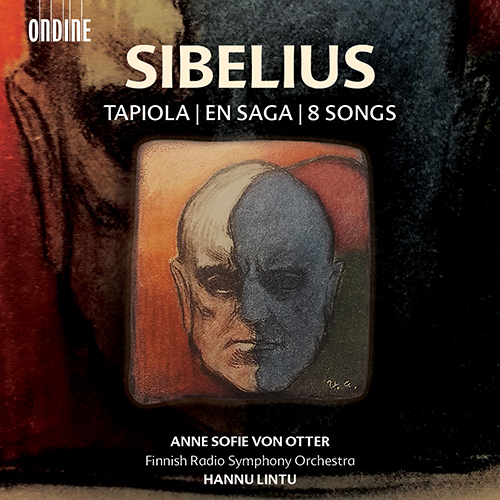SIBELIUS, J.: Tapiola / En Saga / Songs (arr. A. Sallinen for voice and orchestra) (Otter, Finnish Radio Symphony, Lintu)

Jessica Pratt was born in Bristol in 1979 and studied singing in Australia and Europe. She has won several scholarships and prizes, in Rome, at the Sydney Opera, at the Metropolitan Opera New York and at the Vienna State Opera.
She made her early appearances in Il re pastore with the Rome Sinfonietta, in La rondine in Sydney, and in Il signor Bruschino with the Accademia di Santa Cecilia. In autumn 2007 she made her début in the title rôle in Donizetti’s Lucia di Lammermoor with AsLiCo (Associazione Lirica e Concertistica Italiana). The following year she appeared at the Rossini in Wildbad Festival as Desdemona in Rossini’s Otello.
The recording (Naxos 8.660275–76) was released to critical acclaim. In 2009 she appeared for the first time at the Teatro alla Scala in Milan as La Prima Donna in Donizetti’s Le convenienze ed inconvenienze teatrali, a performance which was televised live in Europe.
Her first engagement at the Royal Opera House, Covent Garden took place in February 2011 in the rôle of The Queen of the Night (Die Zauberflöte) under the baton of Sir Colin Davis.
Other performances include Amina (La Sonnambula) and Lucia at La Fenice in Venice, the title rôle of Adelaide in Borgogna and Amira in Ciro in Babilonia at the Pesaro Rossini Festival, Gilda (Rigoletto) at the Parma Verdi Festival, Lucia at Deutsche Oper Berlin and Matilde (Guillaume Tell) in Lima with Juan Diego Florez as Arnold.
Formed in 1933 – the inaugural year of the Festival of Maggio Musicale Fiorentino – under the guidance of Andrea Morosini, the Coro del Maggio Musicale Fiorentino is one of the most prestigious Italian vocal ensembles across both opera and symphonic repertoire. The chorus has also explored the fields of chamber and contemporary music, giving important premiere performances of works by Penderecki, Dallapiccola, Petrassi, Nono and Bussotti. In recent years the chorus has expanded its repertoire to include major choral symphonies, classical and modern works, and has participated in international tours both as an independent ensemble and with the Orchestra del Maggio Musicale Fiorentino. The willingness and ability to interpret works of different periods and styles in their original language have made the Coro del Maggio Musicale Fiorentino one of the most flexible and appreciated ensembles of conductors and international critics.

Photo: Pietro Paolini - TerraProject - Contrasto
Founded in 1928 by Vittorio Gui as Stabile Orchestrale Fiorentina, the Orchestra del Maggio Musicale Fiorentino has performed in the concert and operatic seasons of the Teatro Comunale of Florence since its inception.
Gui was succeeded as permanent conductor by Mario Rossi and Bruno Bartoletti; Riccardo Muti and Zubin Mehta have also served as principal conductors. Throughout its history the Maggio Musicale Orchestra has been led by conductors such as Victor de Sabata, Antonio Guarnieri, Gianandrea Gavazzeni, Tullio Serafin, Wilhelm Furtwängler, Bruno Walter, Otto Klemperer, Issay Dobrowen, Erich Kleiber, Artur Rodziński, Dimitri Mitropoulos, Herbert von Karajan, Leonard Bernstein, Thomas Schippers, Claudio Abbado, Lorin Maazel, Carlo Maria Giulini, Georges Prêtre, Wolfgang Sawallisch, Carlos Kleiber, Georg Solti, Riccardo Chailly, Giuseppe Sinopoli, Seiji Ozawa and Fabio Luisi, who was its musical director from April 2018 to July 2019. Daniele Gatti is currently principal conductor, and Zubin Mehta is Honorary Conductor for Life.

Photo: Pietro Paolini - TerraProject - Contrasto

A native of Bergamo, Donizetti was, for nearly a decade after the early death of Bellini in 1835, the leading composer of Italian opera. He had his first success with Zoraida di Granata in 1822. There followed a series of nearly 60 more operas and a move to Paris, where Rossini had been induced to settle to his profit. His final illness confined him to a hospital in France for some 17 months before his return to Bergamo, where he died in 1848. Donizetti was not exclusively a composer of opera; he wrote music of all kinds – songs, chamber music, piano music and a quantity of music for the church.
Operas
The opera Anna Bolena, which won considerable success when it was first staged in Milan in 1830, provides a popular soprano aria in its final ‘Piangete voi?’, while ‘Deserto in terra’, from the last opera, Dom Sébastien, staged in Paris in 1843, has been a favourite with operatic tenors from Caruso to Pavarotti. The comedy Don Pasquale, staged in Paris in 1843, is a well-loved part of standard operatic repertoire, as is L’elisir d’amore (‘The Elixir of Love’), from which the tenor aria ‘Una furtiva lagrima’ (‘A hidden tear’) is particularly well known. Mention should be made of La Favorite and La Fille du régiment (‘The Daughter of the Regiment’), both first staged in Paris in 1840 and sources of further operatic recital arias. The second of these was revised for Milan under the title La figlia del reggimento. Lucia di Lammermoor, based on a novel by Sir Walter Scott, provides intense musical drama for tenors in the last act with ‘Tomba degl’avei miei’ (‘Tomb of my forebears’), and for the heroine in her famous mad scene.
Orchestral Music
Donizetti’s orchestral music dates largely from his earlier years. It includes symphonies and concertos written in adolescence but showing the extent of his early gifts.
Songs
Donizetti’s many songs demonstrate his particular gift for melody, exemplified also, of course, in his operas.































